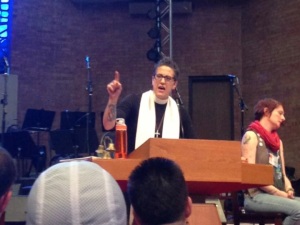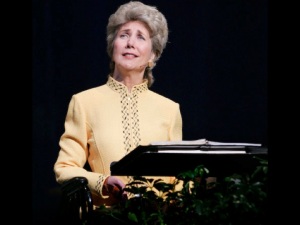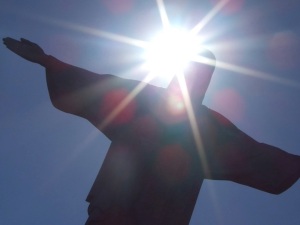“Can You Believe It?”
Mark 16:1-14
April 20, 2014, First Presbyterian Church of Jesup
 Easter morning growing up I remember waking up early, my often-groggy eyes opening excitedly in the anticipation of what was to come. Then my sister and I would wake our parents and rush them downstairs so we could see what the Easter bunny had brought for us. We were excited because to us Easter meant baskets and chocolate and home sewn often-matching Easter dresses. Over the years we celebrate Easter in a variety of locations, from my grandparents house in Chattanooga, TN, to Florida on a spring break vacation, own home, but each time the routine was similar, the feeling was similar: joy, anticipation, and family.
Easter morning growing up I remember waking up early, my often-groggy eyes opening excitedly in the anticipation of what was to come. Then my sister and I would wake our parents and rush them downstairs so we could see what the Easter bunny had brought for us. We were excited because to us Easter meant baskets and chocolate and home sewn often-matching Easter dresses. Over the years we celebrate Easter in a variety of locations, from my grandparents house in Chattanooga, TN, to Florida on a spring break vacation, own home, but each time the routine was similar, the feeling was similar: joy, anticipation, and family.
 Two thousand years ago, the first Easter held a very different feeling: sadness, fear, and grief. We are told was early in the morning, the day after the Sabbath, and Mary Magdalene, Mary the mother of James, and Salome went to the tomb where Jesus was laid. They likely walked slowly in the morning light, united in the grief that things would never be the same with this Jesus they had all followed, they had all loved. They brought with them spices for anointing Jesus’ body, which meant of course that they were expecting a body. They were coming as they likely had to so many other gravesides, to do the dirty work of grief, washing, anointing, preparing. They were worried about the logistics: who would roll away the tomb, how would they draw close to their beloved Jesus?
Two thousand years ago, the first Easter held a very different feeling: sadness, fear, and grief. We are told was early in the morning, the day after the Sabbath, and Mary Magdalene, Mary the mother of James, and Salome went to the tomb where Jesus was laid. They likely walked slowly in the morning light, united in the grief that things would never be the same with this Jesus they had all followed, they had all loved. They brought with them spices for anointing Jesus’ body, which meant of course that they were expecting a body. They were coming as they likely had to so many other gravesides, to do the dirty work of grief, washing, anointing, preparing. They were worried about the logistics: who would roll away the tomb, how would they draw close to their beloved Jesus?
They were coming for a funeral, a memorial. What they found was an entirely different scene.
 They approach the tomb and there they find the stone had already been rolled away. At this point I would imagine their adrenaline would kick in, wondering who else could be there, what their motivations were for rolling back that stone. Were they friends or would they wish these women harm?
They approach the tomb and there they find the stone had already been rolled away. At this point I would imagine their adrenaline would kick in, wondering who else could be there, what their motivations were for rolling back that stone. Were they friends or would they wish these women harm?
 They take a collective deep breath and enter the tomb, where they see a young man, dressed in a white robe. They are frightened by this sight and can you blame them?
They take a collective deep breath and enter the tomb, where they see a young man, dressed in a white robe. They are frightened by this sight and can you blame them?
They were expecting death and found resurrection! They were expecting to see brokenness and saw holiness. It was a shocking sight!
The man says to them, “Do not be alarmed; you are looking for Jesus of Nazareth, who was crucified. He has been raised; he is not here. Look, there is the place they laid him. But go, tell his disciples and Peter that he is going ahead of you to Galilee; there you will see him, just as he told you.”
 We are told that they ran from the tomb, in terror and amazement, and “said nothing to anyone, for they were afraid.”
We are told that they ran from the tomb, in terror and amazement, and “said nothing to anyone, for they were afraid.”
 When you approached the church today, this Easter morning, what did you come expecting? That Easter morning 2000 years ago they were expecting brokenness, they had come in grief. Why aren’t we all dressed in black? We’re here remembering the life of Jesus, right?
When you approached the church today, this Easter morning, what did you come expecting? That Easter morning 2000 years ago they were expecting brokenness, they had come in grief. Why aren’t we all dressed in black? We’re here remembering the life of Jesus, right?
 Well, actually we’re here for much more than that. We’re not dressed for a funeral, because that is not what we’re expecting. Many of us are wearing bright colors, new dresses and ties, colors of Spring, of new life. We have confidence in something more than the death that the women of the Easter morning were expecting, we’ve drawn close to the tomb, not expecting brokenness, but expecting healing. We’ve come expecting not death but resurrection!
Well, actually we’re here for much more than that. We’re not dressed for a funeral, because that is not what we’re expecting. Many of us are wearing bright colors, new dresses and ties, colors of Spring, of new life. We have confidence in something more than the death that the women of the Easter morning were expecting, we’ve drawn close to the tomb, not expecting brokenness, but expecting healing. We’ve come expecting not death but resurrection!
What an incredible thing! Can you believe it?! Can you?
If you’re anything like the disciples, an honest answer might be “no.”
 Let’s be honest with one another this Easter morning, it’s easier to show up in this story after God has already worked out all of this gritty and awful crucifixion business and everything is all grace filled and new life and resurrection. It’s harder to walk with Christ every single day of our lives. It’s harder to come to church on an ordinary Sunday without trumpets and lambs and lilies and the palpable feel of new life.
Let’s be honest with one another this Easter morning, it’s easier to show up in this story after God has already worked out all of this gritty and awful crucifixion business and everything is all grace filled and new life and resurrection. It’s harder to walk with Christ every single day of our lives. It’s harder to come to church on an ordinary Sunday without trumpets and lambs and lilies and the palpable feel of new life.
 We are so much like the disciples, ignoring Jesus when it’s inconvenient, only making time for worship in the extraordinary moments of life. We need to be prompted by angels and miracles to remember the magnitude of our great God. We have no problem coming into God’s presence for weddings, funerals, Christmas, Easter, when we know what God’s story holds for us, but aren’t quite so sure what God has to do with us in the in between times. God has so much going on, God couldn’t possibly care about our day-to-day. When there’s nothing special to ask for or celebrate, God still wants to be with us, to remain in relationship with us in the mundane, so that we will trust in God’s faithfulness when things do get rough and complicated.
We are so much like the disciples, ignoring Jesus when it’s inconvenient, only making time for worship in the extraordinary moments of life. We need to be prompted by angels and miracles to remember the magnitude of our great God. We have no problem coming into God’s presence for weddings, funerals, Christmas, Easter, when we know what God’s story holds for us, but aren’t quite so sure what God has to do with us in the in between times. God has so much going on, God couldn’t possibly care about our day-to-day. When there’s nothing special to ask for or celebrate, God still wants to be with us, to remain in relationship with us in the mundane, so that we will trust in God’s faithfulness when things do get rough and complicated.
Why could none of the disciples stay awake through the night of Maundy Thursday with their Lord, Jesus? Where were these disciples when the crowds were shouting, “crucify him?” Why do the disciples scatter into the darkness of Good Friday? Why do we all gather today when the crucifixion and resurrection has all played out?
 We would love to keep the darkness of those three days in the tomb at a distance, because perhaps then we might be able to ignore our own darkness. We don’t often live our lives expecting angels to show up in the places of our deep sorrow and point to the emptiness where our pain has been and trust that God’s grace has now taken root there. It’s easy to put on a white dress and a bright colored cardigan and to enjoy spring flowers coming to bloom in gardens, but it is very hard to accept the newness of life that God desires to spring inside of us.
We would love to keep the darkness of those three days in the tomb at a distance, because perhaps then we might be able to ignore our own darkness. We don’t often live our lives expecting angels to show up in the places of our deep sorrow and point to the emptiness where our pain has been and trust that God’s grace has now taken root there. It’s easy to put on a white dress and a bright colored cardigan and to enjoy spring flowers coming to bloom in gardens, but it is very hard to accept the newness of life that God desires to spring inside of us.
What is the darkness in your life that you’re spending your time and energy mourning? What would it be like to invite God’s resurrection hope into your hidden pain? What would it be like to accept that there’s an angel sitting in the place of your darkest fears sending you out into the light to share the hope of resurrection?
 Three times in our passage today we are told that the disciples would not believe that Jesus was living again after his death. Three times they are unable to accept that what Jesus had been telling them all along was the truth: that He was the Son of God. That He had come to bring about the Kingdom of God. That they would take part in building the Kingdom of God to come.
Three times in our passage today we are told that the disciples would not believe that Jesus was living again after his death. Three times they are unable to accept that what Jesus had been telling them all along was the truth: that He was the Son of God. That He had come to bring about the Kingdom of God. That they would take part in building the Kingdom of God to come.
If the story had ended at cross, there might’ve been hope of these disciples being off the hook for bring about the whole “thy Kingdom come,” aspect of how Jesus had taught them to pray. If Jesus were simply a man, simply a great teacher who lived an exemplary life, and then died, there wouldn’t be much work for the disciples after his death. For what would this story matter if Jesus wasn’t what He said He was, if their Jesus, wasn’t actually the Christ? It would just be a story of another man with good intentions, who did some nice things for some people who were down on their luck.
 But the story does not end at the cross, nor does it end in the tomb. The tomb is empty, Jesus is resurrected, and the story continues on. Through the disciples, we’ve all come to know the hope of resurrection: that Christ took on the sorrow of the world on the cross, suffered through hell, so that we might share in Christ’s resurrection, so that we might live lives filled with the grace of God.
But the story does not end at the cross, nor does it end in the tomb. The tomb is empty, Jesus is resurrected, and the story continues on. Through the disciples, we’ve all come to know the hope of resurrection: that Christ took on the sorrow of the world on the cross, suffered through hell, so that we might share in Christ’s resurrection, so that we might live lives filled with the grace of God.
 What is your response to this resurrection story? Can you believe it? And more than that, does it matter to you? Are you willing to allow God to roll away your stony thoughts of “having it all together,” and allowing him to free you from the tomb of your hidden darkness? It is my utmost hope and prayer that you will allow this story of grace to be much more than a story to you, that it might be a very real chance at new life. May all of us welcome Christ’s resurrection into our hearts, this Easter morning, and always! Amen.
What is your response to this resurrection story? Can you believe it? And more than that, does it matter to you? Are you willing to allow God to roll away your stony thoughts of “having it all together,” and allowing him to free you from the tomb of your hidden darkness? It is my utmost hope and prayer that you will allow this story of grace to be much more than a story to you, that it might be a very real chance at new life. May all of us welcome Christ’s resurrection into our hearts, this Easter morning, and always! Amen.


























































































 ny guesses to who I might be talking about?
ny guesses to who I might be talking about? Angels announced both of their births. An angel came to Elizabeth, Mary’s cousin, and told her that even in her old age she would have a baby. An angel came to Mary and told her that even though she was a virgin she would have a baby. Surprises all around.
Angels announced both of their births. An angel came to Elizabeth, Mary’s cousin, and told her that even in her old age she would have a baby. An angel came to Mary and told her that even though she was a virgin she would have a baby. Surprises all around.
 John is often depicted like this picture here. Here in this otherwise formal portrait, John is disheveled, a wild man who lived out in the wilderness. He was described wearing a leather belt and a tunic of camel hair, living off locusts and wild honey. His message was not for those who were concerned with appearances, but for those concerned with God’s work throughout our lives and into eternity.
John is often depicted like this picture here. Here in this otherwise formal portrait, John is disheveled, a wild man who lived out in the wilderness. He was described wearing a leather belt and a tunic of camel hair, living off locusts and wild honey. His message was not for those who were concerned with appearances, but for those concerned with God’s work throughout our lives and into eternity. “What should we do?” asked the crowds.
“What should we do?” asked the crowds.
 John lived his life rejoicing in the company of Jesus Christ. As we are already in the midst of this season of giving, this is an important example to remember. In this Christmas season we will both give and receive gifts, but we needn’t get caught up so much in the gifts themselves, but rather on the relationships that surround them. When we give let us remember John’s command for sharing, fairness, and consideration, but also the simplicity and unconditional nature of John’s joy in God’s presence.
John lived his life rejoicing in the company of Jesus Christ. As we are already in the midst of this season of giving, this is an important example to remember. In this Christmas season we will both give and receive gifts, but we needn’t get caught up so much in the gifts themselves, but rather on the relationships that surround them. When we give let us remember John’s command for sharing, fairness, and consideration, but also the simplicity and unconditional nature of John’s joy in God’s presence. My sister and I were talking the other day about some gifts we have given and received over the years. No matter what the material gift was that was received, the ones that had the most impact were those that reflected a genuine, unsolicited knowledge of the recipient. These were gifts that required listening, required paying attention, required being in relationship. The greatest gift we can receive was the gift of being known.
My sister and I were talking the other day about some gifts we have given and received over the years. No matter what the material gift was that was received, the ones that had the most impact were those that reflected a genuine, unsolicited knowledge of the recipient. These were gifts that required listening, required paying attention, required being in relationship. The greatest gift we can receive was the gift of being known. With this in mind, the gifts of the wise men initially seem quite strange. They are coming to celebrate the birth of a baby and bring gold, frankincense, and myrrh. Seems like quite the strange baby shower presents. Surely these were not gifts that Mary and Joseph would’ve registered for at Babies R Us. But the gifts are also right on track because they point to a knowledge of who this little baby Jesus will become. These are gifts of knowing Jesus’ future. The gold was the symbol for the king; frankincense for the priesthood, and myrrh for healing. These gifts, then, point to a greater gift: the most important gift of this season that cannot be wrapped up in a box or written on a check.The most important gift is the gift of Jesus’ life, which is offered at his birth. Even as a baby, these gifts tell us that Christ is the great king, the priest of all priests, who came to heal this broken world.
With this in mind, the gifts of the wise men initially seem quite strange. They are coming to celebrate the birth of a baby and bring gold, frankincense, and myrrh. Seems like quite the strange baby shower presents. Surely these were not gifts that Mary and Joseph would’ve registered for at Babies R Us. But the gifts are also right on track because they point to a knowledge of who this little baby Jesus will become. These are gifts of knowing Jesus’ future. The gold was the symbol for the king; frankincense for the priesthood, and myrrh for healing. These gifts, then, point to a greater gift: the most important gift of this season that cannot be wrapped up in a box or written on a check.The most important gift is the gift of Jesus’ life, which is offered at his birth. Even as a baby, these gifts tell us that Christ is the great king, the priest of all priests, who came to heal this broken world. 
 But let us not let our leaping with joy in Christ’s presence be contained to the wombs of our world, the places where we are comfortable, secure, and nourished. Let us leap throughout out lives, sharing the love of Christ. May we, like John, be a witness to the light of Christ, giving the gift of Christ’s love into this world. Amen.
But let us not let our leaping with joy in Christ’s presence be contained to the wombs of our world, the places where we are comfortable, secure, and nourished. Let us leap throughout out lives, sharing the love of Christ. May we, like John, be a witness to the light of Christ, giving the gift of Christ’s love into this world. Amen.








